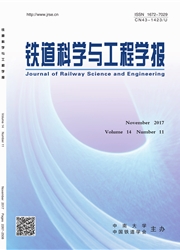

 中文摘要:
中文摘要:
我国高速铁路的运营管理目前主要采用的是委托运营模式,但存在2种不同的财务清算方法,即完全委托运营模式和类似网运分离的委托运营模式。不同的清算模式下,高速铁路公司的财务收入和支出的构成有着很大的区别。通过分析2种模式下高速铁路公司财务支出和收入的构成,并以H高速铁路和L客运专线为例,分析比较我国高速铁路公司在不同财务清算模式下的年度财务状况及其影响因素。分析结果表明:后一种模式下委托双方的利益目标一致性较强,财务清算简便;基础设施折旧、财务费用和客流量是影响高铁公司财务效益的关键因素。
 英文摘要:
英文摘要:
Commission operation mode is mainly adopted by high-speed railway company in China. However, there are two different modes of financial liquidation which are fully commission operation mode and commission operation mode ( similar net-transportation separation mode) . There are significant differences between the consti-tutions of financial expenditures and revenues of high-speed railway companies which are under different financial liquidation modes. In this paper, by analyzing the constitutions of financial expenses and income of high-speed rail companies under two liquidation modes, and taking the H high speed rail and the L passenger dedicated line as the examples, the annual financial situation and its influencing factors of high-speed railway companies under different financial liquidation modes are studied. The results show that under the later mode, the consistence of both sides interest goal is stronger and the financial liquidation is more simple. The infrastructure depreciation, financial cost and passenger flow are the key factors which influence the financial results of high-speed railway companies.
 同期刊论文项目
同期刊论文项目
 同项目期刊论文
同项目期刊论文
 期刊信息
期刊信息
